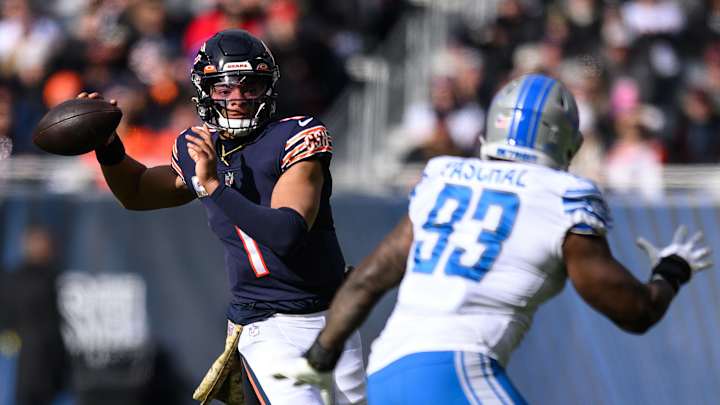Bears Seeing Benefits of Justin Fields' Arm

In this story:
When Sunday's loss to Green Bay ended, Bears receiver Equanimeous St. Brown hardly seemed Justin Fields' favorite guy.
Fields cited St. Brown on the game-deciding interception for not making the hard cut back on whatever pass route the two had going—Fields said a dig route and St. Brown a curl route. Coach Matt Eberflus sided with Fields.
St. Brown was totally complimentary a day later when talking about Fields' passing and the Bears offense in general on a day when they had a season-high 409 yards gained and Fields a season-high 254 yards passing.
The Bears passing game accounted for four passes of 24 yards or longer for the first time in a game this season, and the 56-yarder from Fields to St. Brown matched the longest pass play they've had.
"I mean, he's getting better every week," St. Brown said of Fields. "You (media) guys can see it. We all know he's athletic, but I don't think people give him enough credit as a thrower.
"He's a great passer. He makes impressive throws even on the move. So I think he deserves more credit than he is given as a passer."
The truth is, if Fields is going on to have great success in the NFL it will need to be as a passer. The running ability is great as something to lean on, but avoiding its use will keep him healthier and they'll move the ball more consistently with his arm.
St. Brown thinks it was only a matter of time before the passing game took over.
"I think we've been getting better as an offense this whole season," St. Brown said. "We're a fairly young team. New offense, new scheme. But I think we're getting better."
What made it work for the Bears beyond Fields' 55-yard TD run was a day when he hit the deep pass twice and then had a few other big gains over 20 yards. The 56-yard pass to St. Brown and 49-yarder to N'Keal Harry highlighted it.
Fields was getting the ball downfield at a level he only attained once before -- in his homefield starting debut against Detroit last year.
He finished Sunday's game averaging 10.16 yards per attempt. The only game he did something better was the 2021 win over Detroit but he only completed 11 passes that day and happened to hit a few deep ones.
In this game he completed 20 passes and still went over 10 yards an attempt.
Yards per attempt has long been one of the standard numbers to track NFL passing success.
With the advent of analytical websites and stat services of various types, there have been other numbers that have been forced on the consuming football public as key but yards/attempt remains rock solid.
A quarterback who can't get to 7.0 yard per attempt is going to struggle. It's that simple. It's too difficult to do enough damage when they're nickel-and-diming it or penny-and-nickeling it.
Fields has gone over 7.0 yards per attempt eight times this season in 12 starts. He went over 8.0 four times.
Fields averages 7.5 per attempt on the year. He has a chance to be the second starting Bears quarterback since Jim McMahon took them to the Lombardi Trophy to average 7.5 per attempt or higher.
Jay Cutler did it twice as starter. There have been a few others who did it with only a handful of starts, but they were backups who only played because of injuries or benchings.
It's important for Fields to continue completing the passes downfield and keep that number high.
Five of the last six Super Bowl-winning starting QBs were at 7.6 or higher for the regular season and the one who wasn't was Nick Foles, who was a backup but averaged 9.2 yards an attempt in postseason after he became Philadelphia's starter in 2017.
The Eagles come to Chicago on Dec. 18 for the next Bears game and Jalen Hurts is averaging 8.2 yards per attempt. Last year he averaged 7.3 yards an attempt. Wouldn't Fields love to mirror that?
Continuing to throw deeper and doing it over the final four games is important for Fields. There's no reason why he can't keep doing it.
What's to keep him from doing it? The threat of interception? Who cares? There is nothing at stake for the Bears and he can simply wing it as long as they can block it for him.
Fields' is averaging 9.4 intended air yards per pass, which NextGen Stats says is behind only Marcus Mariota and Tua Tagovailoa among starters.
NextGen says Fields' 6.9 average completed air yards is behind only Tagovailoa, Josh Allen and Mariota among starters.
If what St. Brown said is true, the Bears passing game could be hitting stride even without its best receiver, Darnell Mooney.
The final four games carry little significance other than letting Fields build a rapport with players who can do damage deep like Chase Claypool and Harry. When Mooney returns next year, they could all be in sync with the offense.
So from that respect alone the games are worthwhile for the Bears. The games mean nothing in the standings now but if they continue working the deep passing game it can mean something for future standings.
TICKETS TO SEE JUSTIN FIELDS AND THE BEARS THROUGH SI TICKETS
Twitter: BearDigest@BearsOnMaven

Gene Chamberlain has covered the Chicago Bears full time as a beat writer since 1994 and prior to this on a part-time basis for 10 years. He covered the Bears as a beat writer for Suburban Chicago Newspapers, the Daily Southtown, Copley News Service and has been a contributor for the Daily Herald, the Associated Press, Bear Report, CBS Sports.com and The Sporting News. He also has worked a prep sports writer for Tribune Newspapers and Sun-Times newspapers.